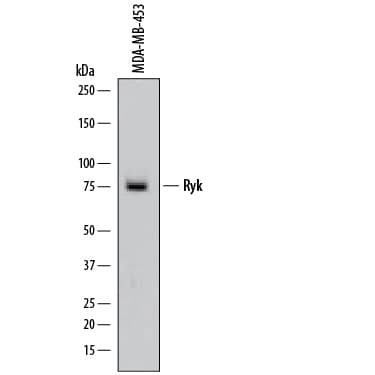Recombinant Human His6-CYLD Isoform 1 Protein, CF
Recombinant Human His6-CYLD Isoform 1 Protein, CF Summary
Product Specifications
Contains an N-terminal 6-His tag
Customers also Viewed
Product Datasheets
Carrier Free
CF stands for Carrier Free (CF). We typically add Bovine Serum Albumin (BSA) as a carrier protein to our recombinant proteins. Adding a carrier protein enhances protein stability, increases shelf-life, and allows the recombinant protein to be stored at a more dilute concentration. The carrier free version does not contain BSA.
In general, we advise purchasing the recombinant protein with BSA for use in cell or tissue culture, or as an ELISA standard. In contrast, the carrier free protein is recommended for applications, in which the presence of BSA could interfere.
E-556
| Formulation | X mg/ml (X μM) in 50 mM HEPES pH 8.0, 200 mM NaCl, 2 mM DTT |
| Shipping | The product is shipped with dry ice or equivalent. Upon receipt, store it immediately at the temperature recommended below. |
| Stability & Storage: | Use a manual defrost freezer and avoid repeated freeze-thaw cycles.
|
Background: CYLD
Ubiquitin carboxyl-terminal hydrolase CYLD (CYLD) is a 956 amino acid (aa) member of the peptidase C67 protein family with a predicted molecular weight of 107 kDa. The mouse and rat CYLD orthologs share 95% and 94% aa sequence identity with the human protein, respectively. Two isoforms of CYLD have been identified, a full-length isoform and a second isoform that lacks aa 305-307 due to alternative splicing (1). Expression of CYLD has been reported in fetal brain as well as adult brain, heart, leukocytes, skeletal muscle, spleen, and testis (1). CYLD acts as a deubiquitinase and removes K63-linked Ubiquitin chains from multiple substrates including IkB, c-Jun, and c-Fos, resulting in the inhibition of NF-kappa B and JNK signaling (2-6). In some contexts, CYLD enhances mitosis entry, and it has also been shown to delay G1/S phase entry suggesting that CYLD regulates multiple phases of the cell cycle (7,8). CYLD is recognized as a tumor suppressor and mutations in CYLD result in skin appendage syndromes including Brooke-Spiegle Syndrome, familial cylindromatosis, and familial trichoepitheliomas type 1 (9). This recombinant protein has an N-terminal His6-tag.
- Bignell, G.R. et al. (2000) Nat. Genet. 25:160.
- Reiley, W. et al. (2004) J. Biol. Chem. 279:55161.
- Miliani de Marval, P. et al. (2011) Cancer Prev. Res. (Phila) 4:851.
- Komander, D. et al. (2008) Mol. Cell 29:451.
- Kovalenko, A. et al. (2003) Nature 424:801.
- Trompouki, E. et al. (2003) Nature 424:793.
- Wickstrom, S.A. et al. (2010) EMBO J. 29:131.
- Stegmeier, F. et al. (2007) Proc. Natl. Acad. Sci. USA 104:8869.
- Saggar, S. et al. (2008) J. Med. Genet. 45:298.
Citation for Recombinant Human His6-CYLD Isoform 1 Protein, CF
R&D Systems personnel manually curate a database that contains references using R&D Systems products. The data collected includes not only links to publications in PubMed, but also provides information about sample types, species, and experimental conditions.
1 Citation: Showing 1 - 1
-
Site-specific ubiquitination of MLKL targets it to endosomes and targets Listeria and Yersinia to the lysosomes
Authors: S Yoon, K Bogdanov, D Wallach
Cell Death and Differentiation, 2022-01-09;0(0):.
Species: Human
Sample Types: Protein
Applications: Bioassay
FAQs
No product specific FAQs exist for this product, however you may
View all Proteins and Enzyme FAQsReviews for Recombinant Human His6-CYLD Isoform 1 Protein, CF
There are currently no reviews for this product. Be the first to review Recombinant Human His6-CYLD Isoform 1 Protein, CF and earn rewards!
Have you used Recombinant Human His6-CYLD Isoform 1 Protein, CF?
Submit a review and receive an Amazon gift card.
$25/€18/£15/$25CAN/¥75 Yuan/¥2500 Yen for a review with an image
$10/€7/£6/$10 CAD/¥70 Yuan/¥1110 Yen for a review without an image










